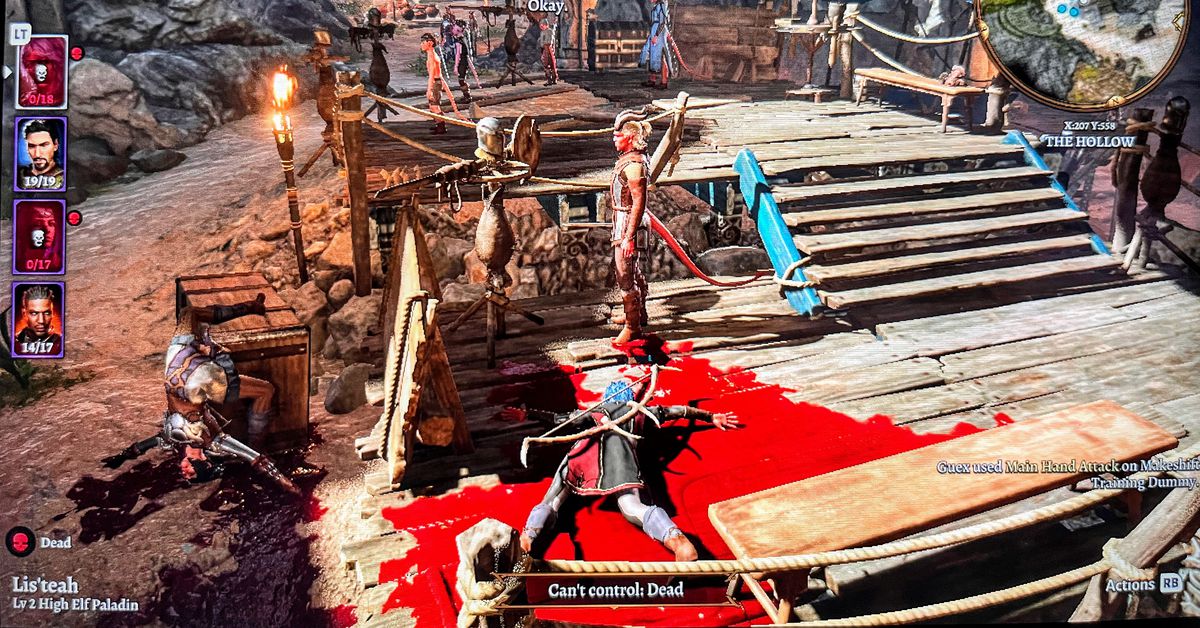
Baldur’s Gate 3 sounds like a fantastic single-player experience. I wish I’d tried that instead of playing with my closest friends!
This isn’t about difficulty: I fully expected to be beaten, shot, stabbed, and otherwise destroyed for taking on enemies too fast. I just wish developer Larian had designed a multiplayer experience that gave me the first freaking clue what’s going on.
Want to make sure you don’t miss an important conversation that might determine the course of the game? Better make sure you’re watching your companions’ character portraits on the left of the screen like a hawk! At any moment, they might click on something or walk somewhere that triggers a cutscene, and a tiny conversation indicator is the difference between getting to listen in — or not.
Want to make nice with the locals instead of becoming a mass murderer and watching entire settlements put to the sword? Well, I sure hope none of your party walks past certain NPCs instead of walking up to them when two people click simultaneously! Not that anything in the game explained that to me afterward. From my perspective, they attacked without provocation, we defended ourselves, and then they went on an unstoppable massacre.
Want to trade your hard-won loot for coin? The first few times I tried that, I was greeted with a totally greyed conversation menu with no dialogue choices — which is apparently Larian’s way of telling you the trader is busy trading with another player. I guess I should have noticed that, but maybe the game could have said something.
Ironically, the one place every player does have explicit control gave my entire party pause: we must have spent eight whole minutes arguing about how to bed down for the night. Apparently, if more than one player clicks on a sleeping bag, it cancels the sleep process — and yet everyone needs to click yes on a pop-up dialogue within 30 seconds to confirm they want to sleep, or the game will automatically cancel the process itself. You can’t just leave it up to a party leader, and you can’t just hop into your own sleeping bag, either.
We get it now, but it feels emblematic of Larian’s tacked-on multiplayer design.
In a good pen-and-paper RPG, like the ones Baldur’s Gate is trying to emulate, the party hangs on the Dungeon Master’s every word. A human being runs the game, and every player is always together, listening in, trying to glean whatever they can about what’s going on. Every bit of humor, every plot revelation, is typically witnessed by every player simultaneously — and while you still get into plenty of trouble, it’s almost always clear why and who’s at fault. I understand that adding a true-to-life DM would be a tall order for a video game, but surely we can do better than this?
Eventually, my group of friends agreed to basically restart the entire game — not just because of the wreckage we’d unintentionally caused, but because two of our party had literally lost the plot. We didn’t understand what this world was about — we’d missed too many conversations — or how to roleplay our do-gooder characters once the game thought we were intent on destruction.
Now, we’re taking things slow, letting one player lead while the rest hang back to avoid the same thing happening again. But it didn’t take long for us to go our separate ways when entering a new town, and I keep finding myself clicking too late to listen in on conversations.
It’s almost enough to make me wish this wasn’t a free-roaming multiplayer game, but one where other players simply dropped in when it’s time to do battle.
https://www.theverge.com/23853139/baldurs-gate-3-multiplayer

